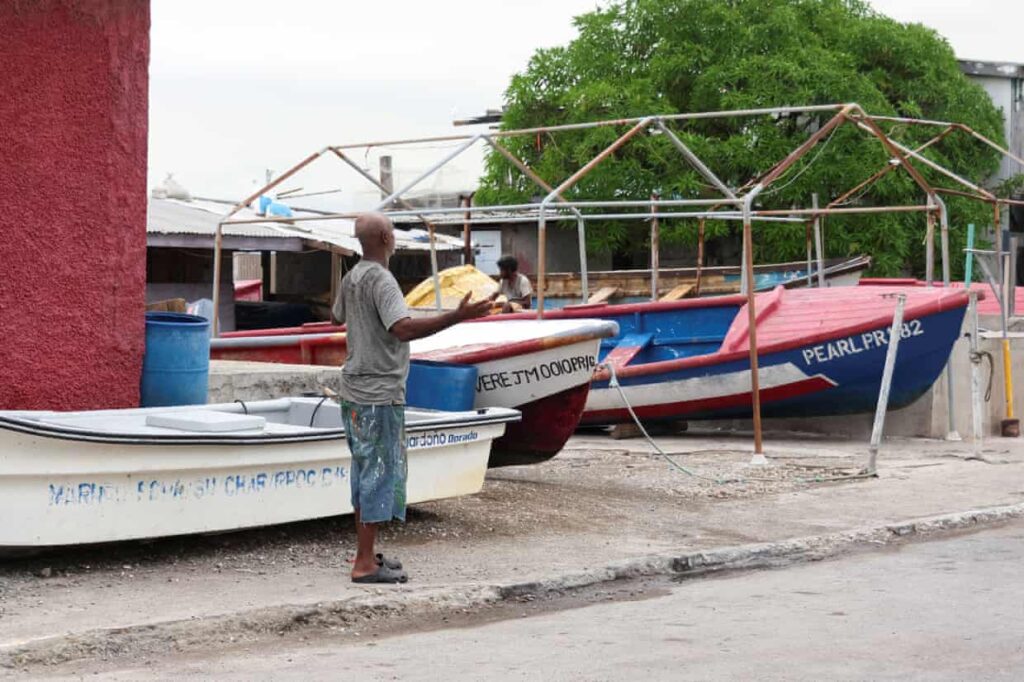Kingston, Jamaica – Hurricane Melissa intensified rapidly into a powerful Category 4 hurricane on Sunday, leaving the northern Caribbean bracing for days of life-threatening winds, torrential rain, and catastrophic flooding. Jamaican authorities issued mandatory evacuation orders for several vulnerable areas, including parts of Kingston, as the storm crept westward at a snail’s pace, intensifying fears of widespread destruction.
Jamaican officials had previously urged residents in low-lying and flood-prone areas to seek shelter, warning that Melissa could escalate to Category 5 intensity. Desmond McKenzie, Jamaica’s Minister of Local Government, sounded a dire warning during a press briefing: “Many of these communities will not survive the flooding. Kingston is extremely low. No community in Kingston is immune.”
Prime Minister Andrew Holness also issued evacuation orders for Port Royal and six other high-risk zones, including Old Harbour Bay. “I urge Jamaicans to take this weather threat seriously. Take all measures to protect yourself,” Holness said. Authorities activated 881 emergency shelters, while all international airports in the country were closed as the storm approached.

As of Sunday night, Melissa was centered about 125 miles south-southwest of Kingston and 310 miles south-southwest of Guantánamo, Cuba. The storm had maximum sustained winds of 145 mph and was moving west at 5 mph, according to the U.S. National Hurricane Center (NHC). Forecasters warned that Melissa could surpass 157 mph if it strengthens to Category 5 on Monday.
Meteorologists forecast up to 30 inches of rainfall on Jamaica and southern Hispaniola, including Haiti and the Dominican Republic, with isolated areas possibly receiving up to 40 inches. Jamie Rhome, deputy director of the NHC, described the storm as “increasingly dire,” warning that its slow movement and rapid intensification are a recipe for catastrophic flooding and destruction.
In Kingston and surrounding areas, residents scrambled to prepare. Yet some, particularly in Port Royal, remained defiant, choosing to ride out the storm at home. Ann Marie Chamberlain, 51, cited past negative experiences in shelters, saying, “Father God will protect us. We know what it is like here. All the boats have been pulled up, roofs with zinc battened down. We are taking necessary precautions.” She recounted that 21 years ago, her first night in a shelter was safe, but as more people arrived, theft and unsafe conditions became rampant.
Derrick Powell, 42, echoed the sentiment, explaining that locals are accustomed to hurricanes and trust their preparations. “We’ve heard about Hurricane Charlie. I experienced Gilbert and all the other storms… We don’t have any gullies or rivers to burst. If a little water comes up, it disappears by the time the rain ends.”
Melissa’s impact on Hispaniola has already been deadly. In Haiti, at least three people have died, while in the Dominican Republic, one fatality has been reported, with another person still missing. Rising river levels, breached riverbanks, flooding, and destroyed bridges have compounded the humanitarian crisis in Haiti. Local authorities have distributed food kits, yet many residents remain reluctant to evacuate.
The Dominican Republic has reported nearly 200 homes damaged, water supply disruptions affecting over half a million people, downed trees, destroyed traffic signals, and small landslides isolating dozens of communities. The storm has revealed infrastructure vulnerabilities across the region, raising urgent concerns about emergency response capabilities.
After Jamaica, Melissa is projected to hit Cuba by late Tuesday, bringing up to 12 inches (300 mm) of rain to provinces including Granma, Santiago de Cuba, Guantánamo, and Holguin. The Cuban government has issued hurricane watches in these areas. By early next week, the storm could affect the southeastern and central Bahamas, as well as the Turks and Caicos Islands.
Experts warn that the slow-moving hurricane will exacerbate flooding, wind damage, and power outages. Emergency management officials are working tirelessly to prepare relief efforts, anticipating extensive damage to homes, roads, and communication networks. “The combination of rapid intensification and sluggish movement is exactly what makes storms like Melissa so dangerous,” said meteorologist Dr. Angela Perez.
Residents across Jamaica have shared their personal stories of hurricane survival, underscoring the tension between trusting official warnings and relying on personal experience. Many older residents remember the devastation of past hurricanes, including Gilbert in 1988 and Charlie in 1951, and feel confident in their ability to protect their homes. Yet authorities caution that Melissa’s strength and slow pace make it far more dangerous than previous storms.
Melissa is the 13th named storm of the 2025 Atlantic hurricane season, which officially runs from June 1 to November 30. NOAA had predicted an above-normal season with 13 to 18 named storms, a forecast now bearing out as Melissa threatens several Caribbean nations with unprecedented flooding and damage.
As authorities continue to monitor the storm, they emphasize the importance of taking all necessary precautions. Shelters, evacuation routes, and emergency services have been mobilized, but the storm’s intensity and trajectory remain unpredictable. Residents are urged to stay informed, follow official instructions, and prepare for days without electricity, clean water, and access to essential services.
For Jamaicans, Cubans, Haitians, and residents of the Bahamas, the next several days could prove critical. With Melissa showing no signs of rapid weakening, emergency response teams, both local and international, are preparing for widespread displacement, infrastructure damage, and long-term humanitarian relief efforts.
As the Atlantic hurricane season continues, Hurricane Melissa serves as a stark reminder of the increasing intensity and unpredictability of storms in the region. The Caribbean now braces for what could be one of the most destructive hurricanes of the season, leaving communities on high alert and governments racing against time to protect lives and property.

